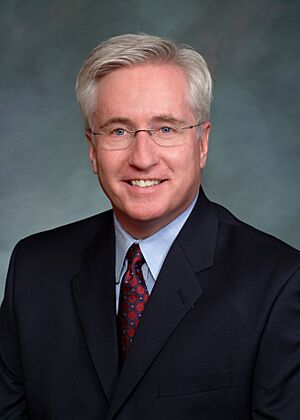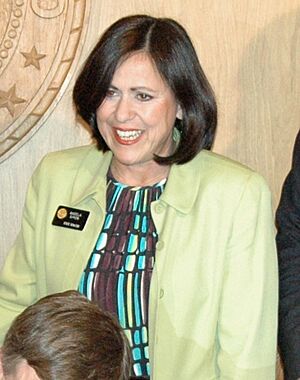2013 Colorado recall election facts for kids
The Colorado recall election of 2013 was a special vote where people decided if two state senators should keep their jobs. This happened because these two senators, John Morse and Angela Giron, supported new laws about gun control. These laws made it harder to buy certain types of gun magazines and required background checks for all gun sales.
At first, people wanted to recall four politicians. But they could only get enough signatures for Senator Morse and Senator Giron. During the time people were collecting signatures, groups from all over the country, both for and against gun rights, got involved. They sent out mail and gave money to support their side.
Morse and Giron tried to stop the recall in court, but they were not successful. The election happened on September 10, 2013. Both Morse and Giron were voted out of office by the people in their districts. They were replaced by two Republican politicians, George Rivera and Bernie Herpin. This was the first time in Colorado history that state lawmakers were recalled. However, about a year later, in the 2014 elections, both Rivera and Herpin lost their seats to Democratic opponents.
Contents
Why the Recall Happened
In early 2013, lawmakers in Colorado passed new laws about guns. This happened after two big shootings: one at a movie theater in Aurora, Colorado and another at a school in Newtown, Connecticut. The new laws said that gun magazines could not hold more than 15 bullets. They also made sure that everyone buying a gun had to pass a background check and pay a small fee for it.
Some people were very unhappy about these new gun laws. They started a movement to recall, or remove, the politicians who supported them. The first people they tried to recall were State Senate President John Morse and State Representative Mike McLachlan. They also tried to recall Senators Evie Hudak and Angela Giron. All four of these politicians were members of the Colorado Democratic Party.
Groups like the Basic Freedom Defense Fund (BFDF) led the effort to recall Morse. Another group called Pueblo Freedom and Rights led the effort against Giron.
During the time people were collecting signatures, there were arguments. Groups supporting Morse said that the people collecting signatures were doing things wrong. On the other side, recall supporters said that Morse's group was confusing the public. Big national groups also got involved. The National Rifle Association (NRA) helped the recall effort by sending mail and donating money. Groups against the recall, like America Votes, got support from people like New York City Mayor Michael Bloomberg and California billionaire Eli Broad.
Getting Enough Signatures
On June 3, 2013, the BFDF group turned in over 16,000 signatures to recall Senator Morse. They only needed 7,178 valid signatures to force a recall election. For Senator Giron, over 13,000 signatures were turned in, and 11,285 were needed.
The efforts to recall McLachlan and Hudak did not get enough signatures, so they were not recalled.
A group supporting Morse said that some signatures were fake, including one from someone who had passed away. The recall supporters said that if anyone committed fraud, they should be punished. They also said that Morse's volunteers were bothering people who signed the petition, asking them to remove their names.
Court Challenges to the Recall
After enough signatures were approved for Morse's recall, he went to court to challenge them. His lawyer said the petitions were not valid. The recall petition for Giron was also approved, and she also challenged it. Both senators said the petitions did not use the exact words required by the state's rules. The Secretary of State's Office, which handles these things, said no to their challenges.
On July 9, 2013, Morse filed a lawsuit to try and stop the recall election. At the same time, the Secretary of State sued to make the Governor, John Hickenlooper, set a date for the election. On July 18, a judge decided that the recall process must continue, even while Morse and Giron were fighting it in court. Governor Hickenlooper then set the election for September 10.
The Election Campaign
Once the election date was set, national groups on both sides of the gun debate got very involved. The National Rifle Association and Americans for Prosperity supported the recall. Groups like Mayors Against Illegal Guns and Mayor Bloomberg were against the recall.
Senator Morse went door-to-door to talk to voters. Both sides accused the other of "mud-slinging," which means saying bad things about their opponents. Morse's supporters were upset about an ad that said he did something wrong, even though he had been cleared of those claims. Giron's supporters were accused of making the election seem like it was only about women's rights.
Money was also a big part of the campaign. Mayor Bloomberg and Eli Broad gave a lot of money to support the senators. The Democratic Legislative Campaign Committee also spent a lot to oppose the recall. The NRA spent money to support the recall. In total, the senators and their supporters spent about $3,000,000 to stop the recall, while recall supporters spent about $500,000.
Who Ran for Office?
Early on, a Republican named George Rivera said he wanted to run for Giron's senate seat. He had planned to run against her in 2014 but decided to run in the recall election instead. He needed 1,000 signatures to be on the ballot and turned in 1,500. Another person, Sonia Negrete Winn, a Democrat, also tried to run but did not get enough signatures. In Morse's district, Republican Bernie Herpin wanted to replace Morse and got enough signatures to be on the ballot.
Voting Rules Changed
On August 7, 2013, the Libertarian Party filed a lawsuit. They said they couldn't get their candidate on the ballot because of a conflict between state law and the state constitution. State law said candidates had 10 days to get signatures, but the constitution said 15 days. On August 12, a judge ruled that the constitution's 15-day rule had to be followed. This meant candidates had until August 26 to turn in their petitions.
This ruling also meant that election officials could not do the election by mail, which is how Colorado usually votes. Instead, they had to open polling places for people to vote in person. Morse said that not voting by mail was "bad for everybody."
On August 27, Governor Hickenlooper asked the Colorado Supreme Court to make it clear if a voter had to vote "yes" to recall a senator in order to vote for a replacement candidate. The Supreme Court ruled that voters did not have to vote for the recall to choose a replacement. However, the senators could only be recalled if most voters chose to remove them. The Secretary of State announced that a Libertarian candidate, Jan Brooks, did not have enough signatures, so only Republican opponents were on the ballot against the recalled senators.
Election Results
Morse accepted his defeat on the evening of September 10. At first, it looked like Giron might win her election. But the final votes showed that Morse was recalled by a small difference: 9,131 votes to recall him and 8,812 to keep him. Giron was also voted out, with 19,451 votes to recall her and 15,376 to keep her. Giron's recall was more surprising because her district usually votes for Democrats. She said she was shocked by the results and believed the recall was due to voter suppression. She mentioned that the rules for voting changed very close to the election.
After the recall, Herpin and Rivera became the new State Senators, replacing Morse and Giron.
District 3 Results
| Party | Candidate | Votes | % | |
|---|---|---|---|---|
| Republican | George Rivera | 19,301 | 88.16 | |
| Democratic | Richard Anglund (write-in) | 2,592 | 11.84 | |
| Total votes | 21,893 | 100 | ||
| Republican gain from Democratic | ||||
District 11 Results
| Party | Candidate | Votes | % | |
|---|---|---|---|---|
| Republican | Bernie Herpin | 8,895 | 83.2 | |
| Libertarian | Jan Brooks (write-in) | 1,796 | 16.8 | |
| Total votes | 10,691 | 100 | ||
| Republican gain from Democratic | ||||
What Happened Next
Reactions to the Recall
Senator Giron and Democratic National Committee Chair Debbie Wasserman Schultz said that the recall happened because of voter suppression. However, the Denver Post newspaper disagreed. They said it was because more people voted against Giron than for her. The Secretary of State, Scott Gessler, also said that Democrats did worse in areas where more people voted. Wasserman Schultz also said that the large amount of money spent by the NRA and the Koch brothers made it impossible for Democrats to win.
Some writers said that the recall was a "grassroots effort," meaning it came from regular people who felt their senators weren't listening. Others saw it as a big win for the NRA and a tough loss for Mayor Bloomberg. A journalist from Reuters said the defeat showed that Democrats in Colorado might have gone too far with their new laws, not just on gun control, but on other issues too.
2014 Elections
In November 2014, about a year after the recall, both George Rivera and Bernie Herpin lost their senate seats in the regular elections. Rivera lost to State Representative Leroy Garcia, and Herpin lost to State Representative Michael Merrifield, who was known for supporting gun control. Even though Democrats won back these two seats, they lost their overall majority in the Colorado Senate.
Another Recall Effort and Resignation
On October 4, 2013, people started another effort to recall Colorado State Senator Evie Hudak, who also supported gun control. She later resigned from her position instead of facing a recall election. Because she resigned, Democrats were able to choose someone to replace her. If she had been recalled by voters, Republicans might have gained more power in the state senate.
 | Charles R. Drew |
 | Benjamin Banneker |
 | Jane C. Wright |
 | Roger Arliner Young |



